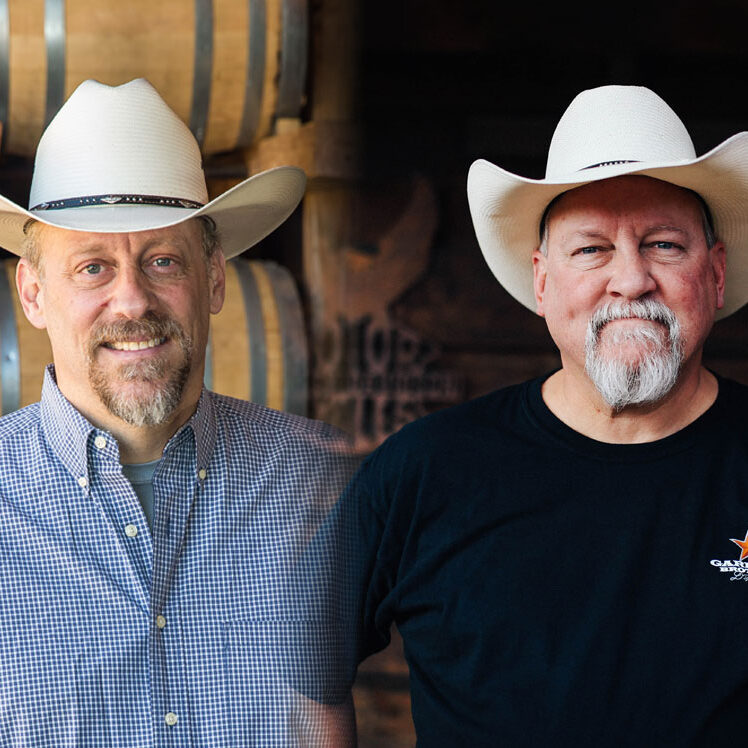
Garrison Brothers with Charlie Garrison

A commitment to quality and authenticity
“I was in awe watching what my brother did to get this business started. He was one of the early pioneers of the craft spirits boom. Everyone told him that you couldn’t make bourbon in Texas.”
Can you give us a bit of background about yourself and how you started in the whiskey industry?
I’ve been in a bunch of different industries. I made a lot of money in some and lost a bunch in others. I was in awe watching what my brother did to get this business started. He was one of the early pioneers of the craft spirits boom. Everyone told him that you couldn’t make bourbon in Texas. It was a terrible idea and I wanted in. I came on board as soon as he had enough bourbon to start selling it.
Can you tell us about your distillery, and what makes it unique?
On top of being the first legal whiskey ever made in Texas and the first of the regional bourbon makers, we only make bourbon whiskey. We see beauty in the process as much or more than the end product. The product is simply a validation of the process and place.
Are there any little ‘distilling’ secrets you can let us in on?
If you are trying to make cheap whiskey, I wouldn’t try it in Texas
Whiskey has been phenomenally successful in the United States and around the planet, why do you think this is compared to other spirits?
I think there are two main reasons – the first is wood. It’s the common denominator. There is something special that wood imposes into whiskey – it does the same thing with BBQ and smoked foods. It’s not just a “good” flavor, It’s complicated and it makes you think.
The second is time. Making whiskey is special because it takes time. Investing years making whiskey gives it a sense of pride and purpose. It creates its own tradition. To be honest I think that is why so many of us get emotional about the makers vs the fakers argument. The fakers just don’t see the beauty in the process.
In your years in the industry, what have been the biggest surprises you have faced?
The first surprise was and still is the biggest. The spirits industry is not a free market. I fought “the system” tooth and nail for years. It kept me up at night. Spirits makers don’t get to control their distribution. That is handled by another “tier”. The interaction with the customer is handled by yet another tier. All of these tiers are legislated. If you want to succeed in this business you have to learn to work within a system that has been carefully and legally crafted over years to benefit the existing players.
What are the big trends that are affecting the whiskey industry at the moment?
I don’t see whiskey’s growth as a trend. I think its part of the societal changes that have come about due to the internet and social media. As I mentioned, whiskey is a product that makes you think about it. It makes you want to understand it. Social media gave whiskey drinkers a chance to start asking questions and learning. The more they posted the more people became interested. In all the years I have been in this I have never come across a podcast devoted to unflavoured vodka. I’ve come across hundreds about whiskey.
Are there any interesting stories from your time in the whiskey industry that you could share?
We try not to take ourselves too seriously but we do take our work seriously. So, most of our stories are about the dumb things we have done. One that jumps to mind is my brother’s decision a while back to go outside late one night to use the head. That’s standard operating procedure in rural Texas. Apparently, game cameras are also standard operating procedure these days and Dan chose the wrong spot. So, I imagine if you want to see my ugly brother’s giblets, they are probably out there on the internet for the world to see.
What developments in the whiskey industry most excite you?
That one is easy. There are whole lot of bees at the picnic table now. It’s pretty easy to chase off a single bee but chasing off hundreds of bees is damned near impossible. We bees are starting to work together to change this industry. I think it’s just a matter of time before the end consumer will get to decide when, where and how they buy their spirits. The free market will win the day.
What do you see as being the future of whiskey in the short term?
Over the past 10 years there were a lot of good business people that saw an industry with great growth potential and jumped on board. That’s a good thing. It has given whiskey a bigger platform and more attention. But I think that many of those folks don’t have a story to tell or a love of the process. They are making widgets as fast as they can and are trying to make the best widgets possible at the best price possible. But the competition keeps getting tougher. In order to get their share of the pie they are having to do unique things to get attention like adding flavouring to their whiskey. I don’t think whiskey drinkers will play that game for very long. Peanut butter whiskey may introduce new people to whiskey but most of those people will go on to beef flavoured rum when that comes out. I think the folks that will be left standing are the ones that are in it because of the beauty of the process. Don’t get me wrong, I don’t have anything against flavoured whiskey but that flavouring needs to be as thoughtful and honest as the whiskey itself.
Why do you use the Glencairn Glass in your business and what makes it so special?
Elegance. Plain and simple. Glencairn was there long before peanut flavoured whiskey and it will be there long after beef flavoured rum. There is something calming and thought provoking about looking into a Glencairn glass filled with a damn good whiskey.